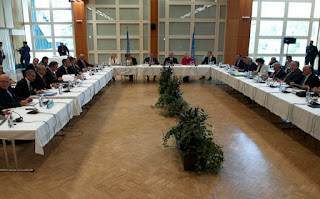A Return to Realpolitik? A Snapshot
In a recent analysis of Barrack Obama’s foreign policy much was made of the fact that in contrast to his predecessor’s value-laden approach, Obama seems to favour Realpolitik. In another recent article it is suggested that the “democracy narrative” was losing ground as all “colour” or “velvet” revolutions of recent years – the Rose Revolution in Georgia in 2003, its Orange counterpart in Ukraine in 2004, the Tulip or Pink Revolution in Kyrgyzstan in 2005 and even the Cedar Revolution in Lebanon in 2005 – have failed to produce much especially in terms of the long-term democratisation and liberalisation of the countries at hand. In fact, it may well be that the ideological underpinnings of the aforementioned revolutions pitting the so-called “good guys” versus the “bad guys” have found themselves lacking sponsors today given the current withdrawal of the neocons from the limelight.
The return to realpolitik is also symbolised, inter alia, by the “reset button” paradigm between the United States and Russia; the strategic arms talks and the signing of the new START Treaty between the two countries on 8 April in Prague; the limited access Georgia’s leader, Mikhail Shaakashvili, has to the Obama administration; the tug of war between Israel’s current government and the United States; and the reported deal between the new Ukrainian leadership and Russia regarding the stay of the Russian Black Sea Fleet in Sevastopol in exchange for lower gas prices. Even the new developing interest-based cooperation between
The missing power in all this manifestations of global change is the European Union (EU) which lacks strategic punch although it has been slowly attempting to acquire it as first expressed almost a decade ago with its European Security Strategy. Yet global change is rapid and the EU is slow in leaving its mark. Recently, we have evidenced, and still are to a large extent witnessing, the failure of the EU to rise up to the challenges posed by financial governance in light of the economic crisis and the stability of its common currency – the euro – where national reflexes based on obtaining necessary domestic political consensus seem to take precedence over joint action (the current German reticence to putting into effect the EU/IMF bailout package for Greece due to domestic political and electoral considerations is a case in point). Similarly, the delayed coordination and the subsequent economic damage caused to air transport by the ash clouds coming from
It stands to reason that in spite all aforementioned examples of EU failure to lead effectively, the demand for a greater EU role is actually increasing. The critique centres around the need for it to do more, not that it is insignificant. Nevertheless, although its consensual-driven approach is time consuming and difficult to achieve, the Union needs to overcome its growing pains and act faster and better to meet the many global challenges that arise.
In the


Comments